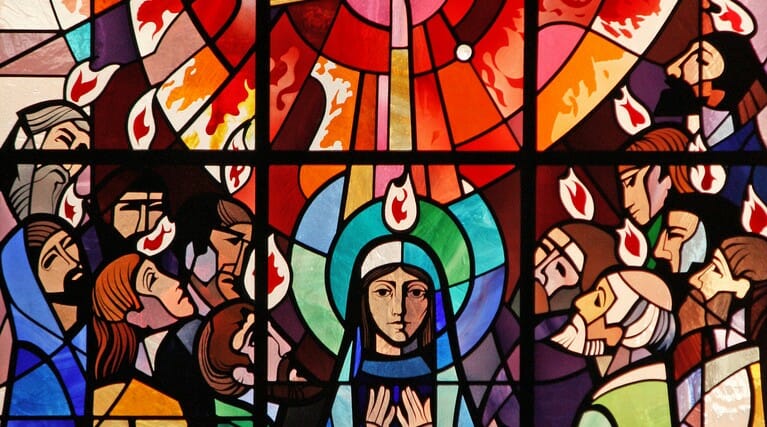
Pentecost can remind us that we are the church
Rev. Dr. Glenn E. Porter Sr.
June 5, 2019
Pentecost Sunday comes 50 days after Easter. Its origin is rooted in the Feast of the Weeks (Leviticus 23:15–21). It’s the time on the Christian calendar when the Church observes the coming of the Holy Spirit. The Pentecost event, recorded in the Book of Acts 2, and the period that follows — generally called the “Season after Pentecost” — are vivid reminders of the role of the church.
On the day of Pentecost, people gathered from a wide variety of places. They are “all together in one place” (Acts 2:1). Then, the Holy Spirit descends, spreads through the crowd, and those assembled begin speaking in different languages, as the Spirit gives them ability.
Scripture tells us that about 3,000 people put their faith in Jesus Christ that day. But what happens after they accept Christ and join the church? The Pentecost event and the surrounding season can serve as a reminder for Christians.
First, this early religious community is worshipping the Lord. There’s a sense of awe among the faithful in the fellowship because of God’s holy influence on their souls. We see that they “believed,” “spent much time together in the temple,” and they are “praising God” (Acts 2:43).
They’re worshippers! Scripture describes expressive types of worship, but ultimately, worship comes directly from the heart. John 4:23–24 tells us: “But the hour is coming, and is now here, when the true worshipers will worship the Father in spirit and truth, for the Father seeks such as these to worship him. God is spirit, and those who worship him must worship in spirit and truth.”
God is looking for worshippers who sincerely love him, and are not “fair-weather” worshippers. God is looking for authentic worshippers, who will give praises throughout all the vicissitudes of life.
God is looking for worshippers who sincerely love him, and are not “fair-weather” worshippers. God is looking for authentic worshippers, who will give praises throughout all the vicissitudes of life.
Second, the Pentecost account demonstrates that the Holy Spirit empowers the Church to use its resources to meet the needs of its community.
The Church testifies to a spirit of koinonia, or “all things common.” Chiefly,
“All who believed were together and had all things in common; they would sell their possessions and goods and distribute the proceeds[a] to all, as any had need. Day by day, as they spent much time together in the temple, they broke bread at home[b] and ate their food with glad and generous[c] hearts” (Acts 2:44–46).
The activities surrounding Pentecost can bring to mind the local church’s mission to consider and meet the needs of its neighborhoods. Churches can be the catalysts for galvanizing neighborhoods to address critical issues of health care, affordable housing, public education, jobs and justice. Arguably, the African-American church has historically viewed its mission through the lens of a social gospel hermeneutic.
And third, Pentecost calls attention to the church as an evangelistic community.
The days following Pentecost do not explicitly reference evangelism. However, it’s implied: “And day by day the Lord added to their number those who were being saved” (Acts 2:47b). Unlike Peter’s message earlier (Acts 2:14–36), verses 43–47 do not mention a preacher or a sermon. And yet, day by day the Lord added to their number those who were being saved.
Without diminishing the preacher’s divine assignment, evangelism is the spreading of the Christian gospel by public preaching or personal witness. All preaching is evangelism but all evangelism is not preaching.
The implication in the text is that folks witnessed the manifestation of the Holy Spirit at work. The community of believers “were together” and “had all things in common.” Folks outside the community watched folks in the community make sacrifices for one another, and provide for others’ needs. Those outside the community witnessed those inside the community enjoying the heartfelt and genuine fellowship of each other. Individuals outside the community witnessed individuals inside the community praising God, and enjoying “the goodwill of all the people” (Acts 2:47).
And because of what they witnessed from outside the community, they wanted to join the community. They wanted to know about this Jesus Christ, who can change hearts and minds. They wanted to join this Christianity movement. It is true that, sometimes, “action speaks louder than words,” and there are times when “it’s better to see a sermon than hear one.”
It’s the witness of the church that can draw people to the church. In case we have forgotten, Pentecost can remind us that we are the church.
The Rev. Dr. Glenn E. Porter Sr. is senior pastor at Queen Street Baptist Church, Norfolk, Va.; adjunct professor of Religious Studies at Tidewater Community College; and volunteer chaplain with the City of Norfolk Police Department. He is author of “Journey With Jesus Through Lent” (Judson Press, 2017). First published in The Christian Citizen May 16, 2018.
The views expressed are those of the author and not necessarily those of American Baptist Home Mission Societies.
Want the latest from The Christian Citizen?
Subscribe to Christian Citizen Weekly

